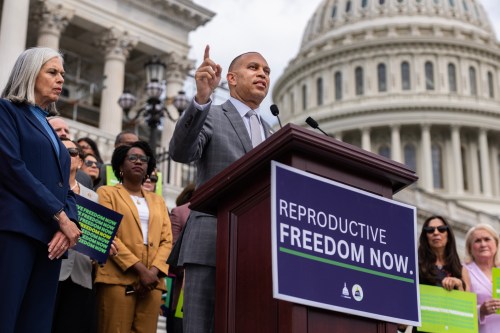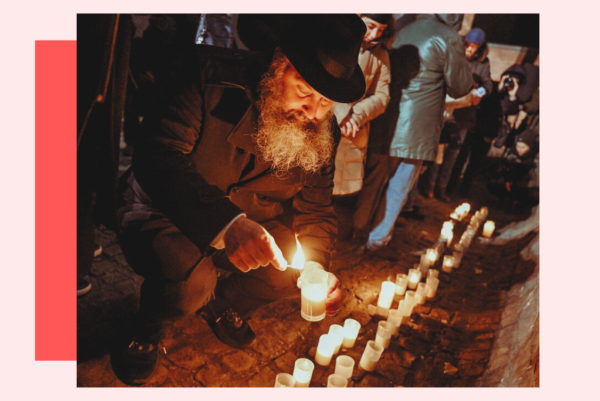Turn any article into a podcast. Upgrade now to start listening.
Premium Members can share articles with friends & family to bypass the paywall.
We’re proud to announce our next event, The Dispatch Town Hall: Grand Rapids on November 4! In partnership with Truscott Rossman and presented by The Bahnsen Group, we’re heading to Grand Rapids, Michigan, for a live recording of The Remnant. Jonah will be joined by Kevin D. Williamson and former Rep. Peter Meijer for a lively discussion about the state of politics today, hosted by The Acton Institute.
After the show, join your fellow Dispatch members for a live comments section—spirited conversation over drinks and hors d'oeuvres. Dispatch Premium members get exclusive VIP access to an intimate meet-and-greet with Jonah and Kevin before the taping.
It’s Tuesday, and the two-year anniversary of the October 7 massacre. On that day, Hamas terrorists murdered more than 1,100 people—814 civilians and 329 Israeli soldiers—of whom 39 were children. The war that followed has killed tens of thousands of Palestinians and more than 400 Israel Defense Forces soldiers. To this day, 20 Israeli hostages are believed to still be alive in Gaza.
Quick Hits: Today’s Top Stories
- The state of Illinois and the city of Chicago sued the Trump administration on Monday, seeking to block the deployment of National Guard troops to Chicago and arguing that the move did not meet the legal conditions necessary to federalize the state’s National Guard over the governor’s objections. The filing came after a federal judge on Sunday ruled that President Donald Trump was temporarily blocked from deploying any National Guard troops to the city of Portland. Judge April M. Perry declined Illinois’ request to issue a temporary restraining order on Monday afternoon. Chicago Mayor Brandon Johnson on Monday also signed an executive order creating “ICE-free zones,” mandating that city-owned property could not be used as operational or staging areas for civil immigration enforcement, and creating an opt-in program for private properties that wished to prevent federal immigration authorities from entering their premises without a valid warrant.
- Ukraine’s General Staff confirmed Monday that drones struck the Feodosia oil terminal in Russian-occupied Crimea overnight, sparking a massive fire at the peninsula’s largest fuel storage facility. The terminal, which can store up to 250,000 tons of fuel and supplies for Russian forces, is situated approximately 250 kilometers from Ukrainian-controlled territory. Ukrainian drones also hit an ammunition depot in Crimea, while Russia claimed to have intercepted 251 drones overnight. The strike comes amid Ukraine’s intensified campaign against Russian energy infrastructure, which has already contributed to widespread fuel shortages across the occupied peninsula.
- The Supreme Court rejected an appeal Monday from Ghislaine Maxwell, the former girlfriend of Jeffrey Epstein. Lawyers for Maxwell, who is serving a 20-year prison sentence for helping to procure teenage girls for Epstein to sexually abuse, argued that she never should have been tried or convicted due to a 2007 non-prosecution agreement that Epstein signed with federal investigators. When asked about pardoning Maxwell later Monday, Trump replied, “I’d have to take a look at it,” and went on to say that the rapper P. Diddy, sentenced last week on two prostitution-related charges, had asked for a pardon.
- China’s Foreign Ministry announced Tuesday that Premier Li Qiang will visit North Korea from Thursday to Saturday to attend the 80th anniversary celebrations of the ruling Workers’ Party of Korea. The visit will mark the highest-level Chinese diplomatic engagement with North Korea since 2019, following an increase in high-level contacts between the two allied neighbors over the past year. Li— China’s No. 2 official after President Xi Jinping—will lead a party and government delegation to the anniversary events. Russia is also sending a delegation led by former President Dmitry Medvedev.
- The Centers for Disease Control and Prevention on Monday officially endorsed recommendations made last month by its Advisory Committee on Immunization Practices, changing the blanket recommendation for getting the COVID vaccine to “shared clinical decision-making” between a patient and provider for people of all ages. It also recommended that the use of the combined measles, mumps, rubella, and chickenpox (MMRV) vaccine be limited to older children. With the change, the requirement for public and private insurance programs to cover the COVID shots is maintained, but no age group is explicitly recommended to receive the vaccine.
- Roughly 200 hikers remain trapped by a blizzard on the slopes of Mount Everest, after almost 1,000 people were caught in a storm while hiking in the Karma Valley on Everest’s eastern slopes over the weekend. Chinese state media reported that rescuers had made contact with the remaining hikers, with rescue teams and villagers from the township of Qudang working to clear heavy snow. More than 350 people have already been rescued and evacuated to Qudang.
- The International Criminal Court on Monday convicted Ali Muhammad Ali Abd-Al-Rahman, a former leader of the Sudanese Janjaweed militia, of crimes against humanity. The ruling found him guilty on 27 counts, including rape, persecution, and murder. Stemming from the U.N. Security Council’s 2005 referral of the case to the ICC after the 2003 conflict in Sudan’s Darfur region, Abd-Al-Rahman’s conviction is the first and only such trial of leaders of the Janjaweed, mostly Arab militias who committed war crimes against rebels in Darfur.
- Treasury Secretary Scott Bessent named Social Security Commissioner Frank Bisignano CEO of the Internal Revenue Service on Monday, the seventh person to lead the agency since the start of Trump’s second term. Bessent is currently serving as acting commissioner of the IRS, meaning that Bisignano will report directly to him without having to be confirmed by the Senate. Bisignano will retain his role at the Social Security Administration and will be charged with overseeing staffing cuts at both agencies.
- Artificial intelligence company OpenAI announced Monday that it had signed a deal with chipmaker AMD to supply OpenAI with AI chips. Shares in AMD rose 34 percent in response to the news of the deal, which the company claims will raise $100 billion in revenue over the next four years from supplying OpenAI and other companies. The deal also gave OpenAI the option to purchase a 10 percent stake in AMD—the latest notable case of vendor financing in the AI space. The same day, OpenAI held its developer conference, where executives announced that their Codex programming tool is now widely available, unveiled AgentKit—a tool that makes it easier to develop specialized AI agents— and introduced an Apps SDK, enabling developers to embed applications in ChatGPT. Initial app integrations include Booking.com, Canva, Coursera, Expedia, Figma, Spotify, and Zillow.
- Former Greek Prime Minister Alexis Tsipras resigned from parliament on Monday, stating that he was “not resigning from political activism.” Tsipras’ exit from the left-wing Syriza party is widely expected to lead to the foundation of a new political party, as Syriza has struggled since it lost power to the center-right New Democracy party in 2023. Greece’s next elections are scheduled for 2027.
731 Days Later

Minutes earlier, they had been dancing.
And as the two dozen or so festivalgoers at the Nova music festival ran from gunfire to one of the nearest havens they could find—a roadside shelter—they could not have known they had entered what would later become known as the “bunker of death.”
“We thought it was a safe place where we would wait awhile, then go home,” Ziv Abud, a 26-year-old survivor from Tel Aviv, told the New York Times in November 2023. Abud had arrived early to the Nova rave with her boyfriend, 26-year-old Eliya Cohen—who was taken hostage and released in February after 505 days in Hamas captivity—and her nephew, 19-year-old Amit Ben Avida, along with his girlfriend, 20-year-old Karin Schwartzman, both of whom were murdered by Hamas terrorists.
Ayelet Arnin, a 22-year-old news editor for Israeli public broadcasting, recorded video clips within the shelter showing the harrowing hours before her eventual murder by Hamas terrorists. The footage, which was later broadcast in the documentary series Zman Emet, captured background audio of the moment Hamas terrorists approached the bunker.
Osama Abu Assa, a 36-year-old Bedouin at the festival, can be heard raising his voice to tell approaching gunmen that he was a Muslim. They responded, “Are there Jews inside?” According to survivors, Assa begged them not to enter the shelter and to spare their lives. He was later found dead.
In the footage, Staff Sgt. Aner Shapira, 22, is also seen intercepting with his hands a grenade that terrorists had tossed into the bunker, and throwing it back out—one of seven grenades the off-duty soldier would successfully hurl out from the shelter, helping ensure some survivors could make it out. It was the eighth that ultimately killed him, detonating in his grasp.
As a non-paying reader, you are receiving a truncated version of The Morning Dispatch. You can read our full item in the members-only version of TMD.
Nitzan Rahoum, 28, is heard shouting, “They took Lidor,” shortly after Lidor Levy, her fiancé and the father of her unborn baby, was gunned down. Rahoum was killed by what was believed to be a grenade blast in the shelter.
It’s been two years since the events of October 7, 2023, when Hamas terrorists broke through the Gaza-Israel barrier, attacking military bases and massacring civilians in 21 communities. Across southern Israel, including at the music festival—held near the Gaza border as a celebration of “friends, love and infinite freedom”—terrorists murdered more than 1,100 people, including 39 children. Three of those were toddlers. Rape was endemic. If their crimes weren’t caught on security cameras or recorded by people in hiding, the terrorists livestreamed and posted them.
And the deaths didn’t end on that day. Shirel Golan, who survived the Nova massacre, committed suicide a year later, the day she turned 22. The war that has followed since—as Israel attempts to take back its hostages and eliminate Hamas—has killed more than 400 Israeli soldiers, and tens of thousands of Palestinians.
“The fact that many innocents were deliberately targeted by Hamas, indeed have lost their lives, [been] hurt, kidnapped to Gaza—the youngest Israeli hostage kidnapped to Gaza among the 251 hostages was a 10-month-old baby—it threw Israeli society into shock,” Uri Weltmann—a national field organizer for Standing Together, a grassroots organization advocating for a ceasefire and hostage release deal—told TMD.
Two years later, the country is still trying to process and endure it. “It’s an ongoing event that is quite hard to process something which is still going on,” Amit Segal, chief political analyst of Israel’s N12 News and author of the “It’s Noon in Israel” newsletter, told TMD. “It’s not even that Israel is post-traumatic because the trauma is still here,” he added. “Half of the hostages [have] not been released yet, and the war is still going on, and there are still [military] casualties.”
The massacre and its aftermath have taken a major psychological toll on Israelis of all ages. A study conducted in the wake of October 7 found that as many as 84 percent of Israeli children suffer from emotional distress. Another study released in February, which examined the attack’s psychological impact on 858 Israelis three months after, concluded that “more than a third of the population was likely to meet at least one [mental health disorder] diagnosis three months after the onset of war activities,” including post-traumatic stress disorder (PTSD), anxiety, and depression, while only about 20 percent of subjects “experienced very low levels of distress and functional impairment.”
At the national level, the attack shattered the notion that Hamas could be deterred through economic incentives and other pressure points. And that newfound realization extended to the country’s other enemies, giving birth to the idea that adversaries had to be neutralized rather than simply managed. In the two years since October 7, Israel has gone on the offensive to significantly degrade the threats posed by terrorist groups Hamas, Hezbollah, the Houthis, and their key state backer, Iran. Yet Hamas’ continued control over Gaza—together with the 20 Israelis believed to be still alive and in terrorist captivity—is a daily reminder of the failures of that day.
They’re also reminders of the challenges Israel has confronted over the course of its Gaza bombing campaign and ground operations, which have yet to fully achieve the government’s main war aims: freeing the hostages and eliminating Hamas as a military and governing entity. But even so, IDF operations have all but hollowed out Hamas’ military leadership, including the group’s top commander, Mohammed Deif, in July 2024, and its leader in Gaza, Yahya Sinwar, in October 2024. More recently, Hamas confirmed the death of its lead propagandist, Abu Obaida, in targeted Israeli airstrikes on Gaza City.
Even outside of Gaza, the plotters of October 7 have not been safe from Israel’s reach. In July 2024, a bomb reportedly planted by Israeli operatives detonated in a guesthouse in Tehran, killing Ismail Haniyeh, Hamas’ top political leader, an operation that Israel in December 2024 acknowledged it had orchestrated. Earlier that year, a reported Israeli drone strike in Beirut killed Hamas’ deputy leader abroad, Saleh al-Arouri, who helped to plan—and even foreshadowed—the multifront war against Israel. Last month, Israel made the unprecedented move of striking a gathering of Hamas negotiators in Qatar’s capital city, Doha, an attack the group has said its senior officials survived.
On September 16, a United Nations commission completed a report that found that Israel’s military actions in Gaza amounted to genocide, which, per the commission’s chairman, Navi Pillay, was executed “with the specific intent to destroy the Palestinian group in Gaza.” However, some military experts, such as John Spencer, the chair of urban warfare studies at the Modern War Institute at West Point, said that Israel has taken unprecedented measures to avoid civilian casualties during wartime, writing in a March 2024 Newsweek article, “By my analysis, Israel has implemented more precautions to prevent civilian harm than any military in history—above and beyond what international law requires and more than the U.S. did in its wars in Iraq and Afghanistan.”
It’s also difficult to access accurate information from on the ground in Gaza, as nearly all public facilities—including hospitals—are overseen by Hamas, as are many news reports that use Hamas fighters for sourcing.
“It’s like reporting out of the Soviet Union or Nazi Germany,” Yehudah Mirsky, a professor of Near Eastern and Judaic studies at Brandeis University and a former State Department official, told TMD. “You can’t be critical about Hamas.”
One primary problem with accusing Israel of genocide, Mirsky continued, is that it doesn’t do anything to stop the fighting between Israel and Hamas. “It’s still puzzling to me, unless I’m being willfully naive, how it is that people don’t realize that the instantaneous piling on onto anything Israel does just gets Israelis’ backs up and doesn’t actually advance any goals.”
“So then Israelis just like, turn it off,” Mirsky added. “News consumers outside of Israel have been exposed to much more coverage of Palestinian civilian suffering in Gaza than Israeli news consumers have. That’s just a fact. And you know, frankly, I do think that’s a problem.”
From the onset of the war, Israeli Prime Minister Benjamin Netanyahu set two goals before deciding to wind down its military operations in Gaza, which, in addition to eliminating Hamas’ terror cell in the area, is “to do everything possible to bring our captives home.” To date, 146 have either been freed or released, and 20 hostages are believed to still be alive in Gaza.
Hamas’ leadership on Friday publicly agreed to the broad terms of President Donald Trump’s proposed 20-point ceasefire and full ceasefire release plan, so long as certain conditions are met, including “Arab and Islamic support” and assurances that governance of Gaza will be transferred to an independent Palestinian body. Specific terms of the plan, and the process for how the release of the remaining hostages will unfold, are yet to be determined, but the White House said it is hopeful of reaching a deal this week. Likewise, it remains unclear how Hamas would relinquish power to some as-yet-unformed government body, but Trump made clear to CNN news anchor Jake Tapper in a Sunday text message that, if the terrorist group attempts to keep a foothold in the Gaza Strip, it would be “complete obliteration!”
Today’s Must-Read
Back in 2019, an unprecedented group of thousands of economists signed a public letter in favor of a carbon tax as the best solution to climate change. At the same time, legislation known as the Green New Deal was gaining popularity among progressives and climate activists. The Green New Deal legislation put forward a top-down, public-sector approach to addressing climate change. While the exact parameters of the Green New Deal were vague, it emphasized massive-scale federal investment in climate-related infrastructure projects, invoking FDR’s New Deal. The climate activists downplayed or even dismissed carbon taxes—fees on greenhouse gases emitted by fossil fuel use and other economic activity—as both regressive and inadequate to achieving their goals. While the Green New Deal was not a serious legislative proposal, the Biden administration’s approach to addressing climate change was closer to the Green New Deal approach than it was to carbon pricing.
Toeing the Company Line
American vs. American
The end state of Trumpism.
Adam Smith and Digital Outrage
What the father of modern economics might say about our social media culture.
The Power Theory of Free Speech
Why widespread hypocrisy about free speech makes the First Amendment all the more important.
In New Jersey and Virginia, Is Trump an Asset or Liability?
Neither the president nor his VP has campaigned for the GOP gubernatorial candidates.
Are Democrats Ready to Welcome Pro-Life Candidates?
A recent suggestion for expanding the party’s appeal gets a lukewarm reception.
SCOTUS Long Conference and ‘Insecure Originalists’
The court begins its 2025-2026 term.
Worth Your Time
- One of the most horrifying, underappreciated elements of the Nova music festival massacre is that many of the festivalgoers were under the effect of psychedelics while they endured the horror. As the authors of “The Worst Trip Ever” write in Tablet, “As the sun rose on Oct. 7, amid the pulsing beats and vibrant atmosphere of the open air rave, Hamas invaded. Sunrise was also the moment at which many rave participants had just begun to experience the full psychoactive effects of the psychedelic substances they had taken. At the same moment, Hamas invaded the festival premises and began shooting at participants, chasing them down the surrounding fields, raping them, and kidnapping them, festivalgoers were under the acute effects of drugs like 3,4-Methylenedioxymethamphetamine (MDMA) and lysergic acid diethylamide (LSD), while running for their lives in an attempt to escape the terrorists.”
- How strong is the economy, really? Natasha Sarin—president of Yale’s Budget Lab and a former official in Biden’s Treasury—argues in the New York Times that there are actually two economies: “A.I. and Everything Else.” As she writes, “The economy is being bolstered by a remarkable investment boom in artificial intelligence. A credible estimate suggests that A.I. capital expenditures may reach 2 percent of the gross domestic product in 2025, up from most likely less than 0.1 percent in 2022. To provide some sense of scale, that means the equivalent of about $1,800 per person in America will be invested this year on A.I.” As she continues, were it not for “these investments, economic growth this year might have clocked in at around 1 percent. Instead, it is likely to land at almost twice that. Just seven large technology companies are responsible for nearly 60 percent of the gains in the S&P 500 this year.” As she sums it up: “The situation is worse than having all of your economic eggs in one basket. It’s closer to putting all of your eggs in one basket and stomping on all the other baskets.”
Presented Without Comment
Wall Street Journal: Trump’s Immigration Push Diverts U.S. Agents From Drug, Money, and Sex-Crime Cases
Also Presented Without Comment
Buenos Aires Times: Milei Presents New Book Singing Rock in Midst of Political Crisis
Also Also Presented Without Comment
ABC: Eastern Australian Humpback Whale Population Now Well Above Pre-Whaling Levels, Report Finds
Once hunted almost to extinction, the group of humpback whales currently migrating down Australia's east coast has bounced back — and then some. In a preliminary report to the federal Department of Climate Change, Energy, the Environment and Water, marine scientists estimate there were more than 50,000 eastern Australian humpback whales (Megaptera novaeangliae) in 2024.
Behind The Scenes
Today’s “Behind the Scenes” comes in response to questions about how we refer to transgender people in TMD. Robert commented yesterday:
Above, TD writes that “Sophie Roske” pled guilty to the attempted assassination of Justice Kavanaugh. No legal documents charged “Sophie” with anything. They charged Nicholas, which is the would-be assassin’s legal name.
TMD Editor Ross Anderson: Some publications go out of their way to only refer to a transgender person by the gender with which he or she identifies, in a way that is clearly misinforming to the reader. Others lean heavily on pointing out that someone identifies as transgender, even when it has no relevance to what he or she did or what the story is about. The Dispatch’s style guide on these issues emphasizes the importance of “balancing our commitment to clarity and accuracy with our promise to engage in public debates charitably and respectfully.”
What does that mean in practice?
If relevant to the story, our reporting will always mention if people identify as transgender, including both their biological sex and what they identify as. Here’s how we handled the relevant sentence in yesterday’s Quick Hit:
Sophie Roske—a biological male whose lawyers last month claimed was a transgender woman—pleaded guilty in April and, per court documents, admitted to traveling from California with the intent to kill three justices.
It would be misleading to refer to the would-be assassin as “Sophie Roske, a 29-year-old woman,” but it would be a different kind of misleading to refer to the would-be assassin only as “Nicholas Roske, a 29-year-old man.” Roske’s gender identity is a part of the story—the judge who handled the sentencing in the case said she took it into account when making her decision—and not mentioning it would be a disservice to our readers.
When writing about people who identify as transgender, we try to avoid pronoun usage when possible and instead refer to individuals using surnames. But on first reference, we generally do refer to them with the first name that they go by, just as we would anyone who decides to change his or her name or go by a nickname.
These are of course delicate issues, and no media outlet has a monopoly on the correct way to handle them. Some of our Dispatch colleagues on the opinion side have taken a different approach in their work. But TMD is fundamentally a news product, and the job of this newsletter is to convey the information we believe you need to know as clearly and fairly as possible, while not adding to the noise and outrage-bait. We believe this approach accomplishes that goal.
To read TMD editor Ross Anderson’s response to the question—or to submit one of your own—become a member today.
Let Us Know
Have any thoughts or questions about today’s newsletter? Drop us a note in the comments or by emailing us at tmd.questions@thedispatch.com. We read every submission, and your message could be featured in tomorrow’s “Behind the Scenes” segment.
Have any thoughts or questions about today’s newsletter? Become a member to unlock commenting privileges and access to a members-only email address. We read every submission, and answer questions in the following edition of TMD.


















Please note that we at The Dispatch hold ourselves, our work, and our commenters to a higher standard than other places on the internet. We welcome comments that foster genuine debate or discussion—including comments critical of us or our work—but responses that include ad hominem attacks on fellow Dispatch members or are intended to stoke fear and anger may be moderated.
With your membership, you only have the ability to comment on The Morning Dispatch articles. Consider upgrading to join the conversation everywhere.